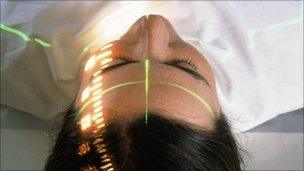Many cancer patients 'missing out on radiotherapy'
- Published

Are too few patients getting radiotherapy?
Tens of thousands of cancer patients are not being given the most successful treatments, according to a panel of radiotherapists.
They claim too few people are getting radiotherapy because GPs and the public see drugs and surgery as better options.
They warn this could explain why the UK has lower cancer survival rates.
The government's national clinical director for cancer said more money was being invested in radiotherapy.
It is estimated that 52% of all cancer patients in the UK should receive radiotherapy, but the actual figures fall short.
In England and Wales 38% of patients get radiotherapy, 35% in Northern Ireland and 43% in Scotland.
But the experts say that suggests approximately 30,000 cancer patients are not getting what they would consider the best treatment.
Fall from grace
A YouGov poll of 2,000 members of the public showed fewer than one in 10 consider radiotherapy to be a modern form of cancer treatment with 40% describing the procedure as frightening.
Dr Jane Barrett, president of the Royal College of Radiologists, said: "Twenty years ago the public was told that radiotherapy was a treatment of the past and would be superseded by a magic bullet, but radiotherapy is still a magic bullet."
"Even people in the profession didn't realise it could become a modern medicine with the use of computer imagery. The perception fell behind the reality."
Charlotte Beardmore, from the Society and College of Radiographers, said patients often had misconceptions about the therapy such as becoming radioactive during the treatment.
Professionals also admitted anti-cancer drugs, backed by the pharmaceutical industry, were better promoted than radiotherapy.
Dr Barrett said GPs were also poorly informed about the subject: "Radiotherapy plays a very small part in a doctor's training, unless you're going to be a clinical oncologist, compared with drugs and surgery which play a part in many fields."
The National Radiotherapy Awareness Initiative is trying to improve radiotherapy's reputation.
It says radiotherapy cures more people than chemotherapy, is 13 times more cost effective and is targeted to within millimetres.
Professor Tim Maughan, oncologist at the Velindre Hospital in Cardiff, criticised the government's decision to set up a cancer drugs fund worth £200m a year.
He said: "It's the wrong decision. I don't understand how we can chose to spend money on drugs which have not been deemed cost effect by NICE (the National Institute of Health and Clinical Excellence).
Professor Mike Richards, national clinical director for cancer, said: "Radiotherapy is one of the key treatments for cancer, improving access to and uptake of radiotherapy will undoubtedly contribute to saving lives.
"The recently published national cancer strategy clearly recognises the role of radiotherapy and commits additional funding."
The future
New technologies, such as Intensity Modulated Radiotherapy (IMRT), are more effective at targeting the radiation at the tumour, minimising damage to nearby tissues and reducing side effects.
But here the UK lags behind. In Europe around 20% of patients have access to IMRT, in the UK it is only 7%.
One of the newest forms of treatment, proton beam therapy, fires particles at a tumour rather than using radiation waves.
Patients in the UK are already being sent to Europe for this treatment, which is even much more focused.
A decision on setting up a proton radiotherapy centre in the UK will be made in April.
- Published7 September 2010
- Published7 September 2010